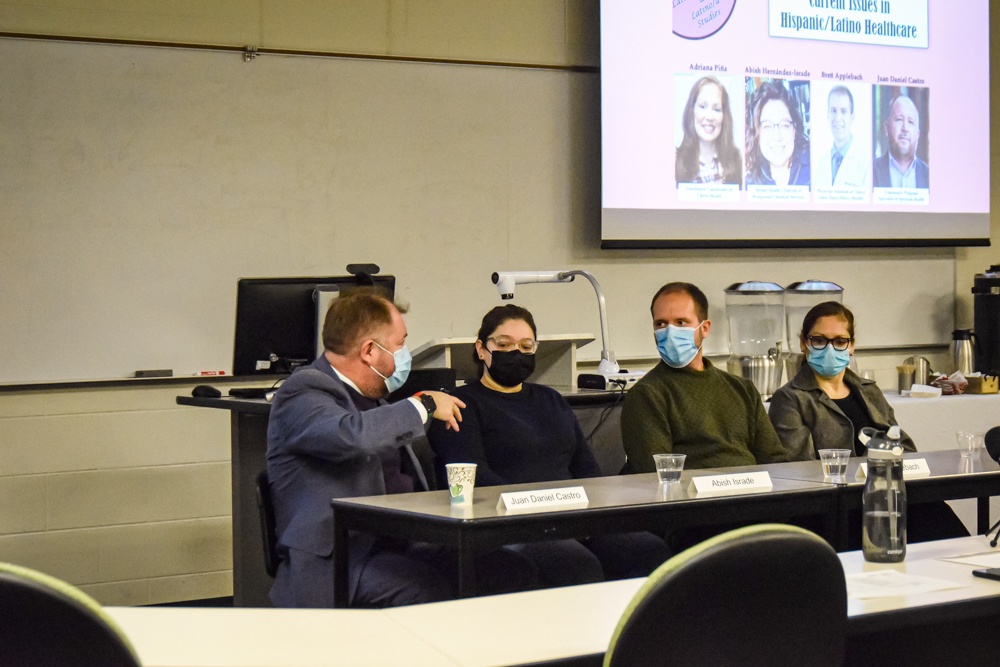In Other PAS News
Medical panel discusses Hispanic community and healthcare access
March 21, 2022

Medical panel discusses Hispanic community and healthcare access
Clemence
Daniere, Staff Writer
March 21, 2022
On March 15, several Grand Valley State University departments came together to host a Q&A panel inviting healthcare professionals to discuss current issues in Hispanic/Latino healthcare. The event included faculty and other staff from the Physicians Assistant Studies, Modern Languages and Literature and Latin American and Latino Studies departments.
Professor Bret Lindford, the main coordinator and founder of the event, has been recruiting healthcare professionals involved in the Hispanic community to speak at GVSU since 2016. This year, he invited Cherry Health Enrollment Coordinator Adriana Piña and Spectrum Health Community Programs Specialist Juan Daniel Castro, as well as GVSU alums Abish Hernández-Israde and Brett Applebach to speak about their experiences dealing with Hispanic-centered healthcare issues.
During the panel, the floor was open for students to ask questions about their curiosities, interests and concerns. Students from Lindford’s class attended because of the direct correlation between the panel and the content they’ve been learning this semester.
One of the first questions asked related to why each of the panelists decided to choose a career in healthcare.
“To help people see what’s going on in the world and what’s going on with a lot of diversity that you see,” Piña said. “People from different types of countries are coming to this area and you’re seeing that everyone has their own limitations and their own things that they need help with. They need that type of assistance.”
In her experience, Piña said she has noticed that Hispanic people who come to the United States are not well versed in U.S. culture and look to her to find a way to fit in. Their acquisition of information depends on healthcare workers’ abilities to connect and understand their unusual situations.
Regarding common health risks, Applebach, a physician’s assistant at Clinica Santa Maria, discussed the dangers of generalization and the importance of treating every patient as an individual rather than an extension of a social group. Applebach said there are many important differences in people that could be overlooked due to generalization.
“There’s also a difference between a diabetic person and a person suffering from diabetes, because people are not their diagnoses,” Castro said. “Language is a powerful tool and people notice the language you’re using. It can be good or exclude and it’s up to us for language to do the trick for us.”
Castro’s self-proclaimed goal has always been to break the literacy barrier that prevents people from accessing healthcare. He said he believes that everyone has a certain degree of illiteracy, especially when it comes down to medical and professional jargon. These words create walls that stop the Hispanic and Latino community from receiving the medical help that they need and deserve. His advocacy work is especially focused on creating that bridge between literacy and healthcare.
“You have to be sensitive, you’ll find people who are crying and looking to you to explain to them a solution,” Piña said. “They are looking for you and seeking you because they know that you are able to assist.”
Hernández-Israde was able to relate to this issue with her background and current position as a mental health clinician at Wedgwood Christian Services. She and the other panelists discussed the issue of affordability for healthcare and focused on the lack of access to mental health services due to burdens from physical health expenses. Hernández-Israde said that people shouldn’t have to choose between mental and physical health services and said both should be readily accessible.
Lindford’s creation of this event stemmed from his limited knowledge in Spanish in medical care, which led him to reach out to experts to teach him and his students about the field. He said he wanted to focus on the harm of stereotypes and generalizations of the Hispanic community.
“Ideally, what I hope is that it raises awareness to some of the challenges that Hispanics and Latinos face when it comes to obtaining quality medical care and also things that we can do,” Lindford said. ”My class has a really big focus on being open-minded, respectful and getting to know the person on a personal level with desires and needs and not relying on stereotypes.”
This event was an extension to SPA 304, “Spanish for Health Professionals,” which is a class offered at GVSU for students majoring or minoring in Spanish. Students interested in this topic are encouraged to register for this class or reach out to an academic advisor for more information.
